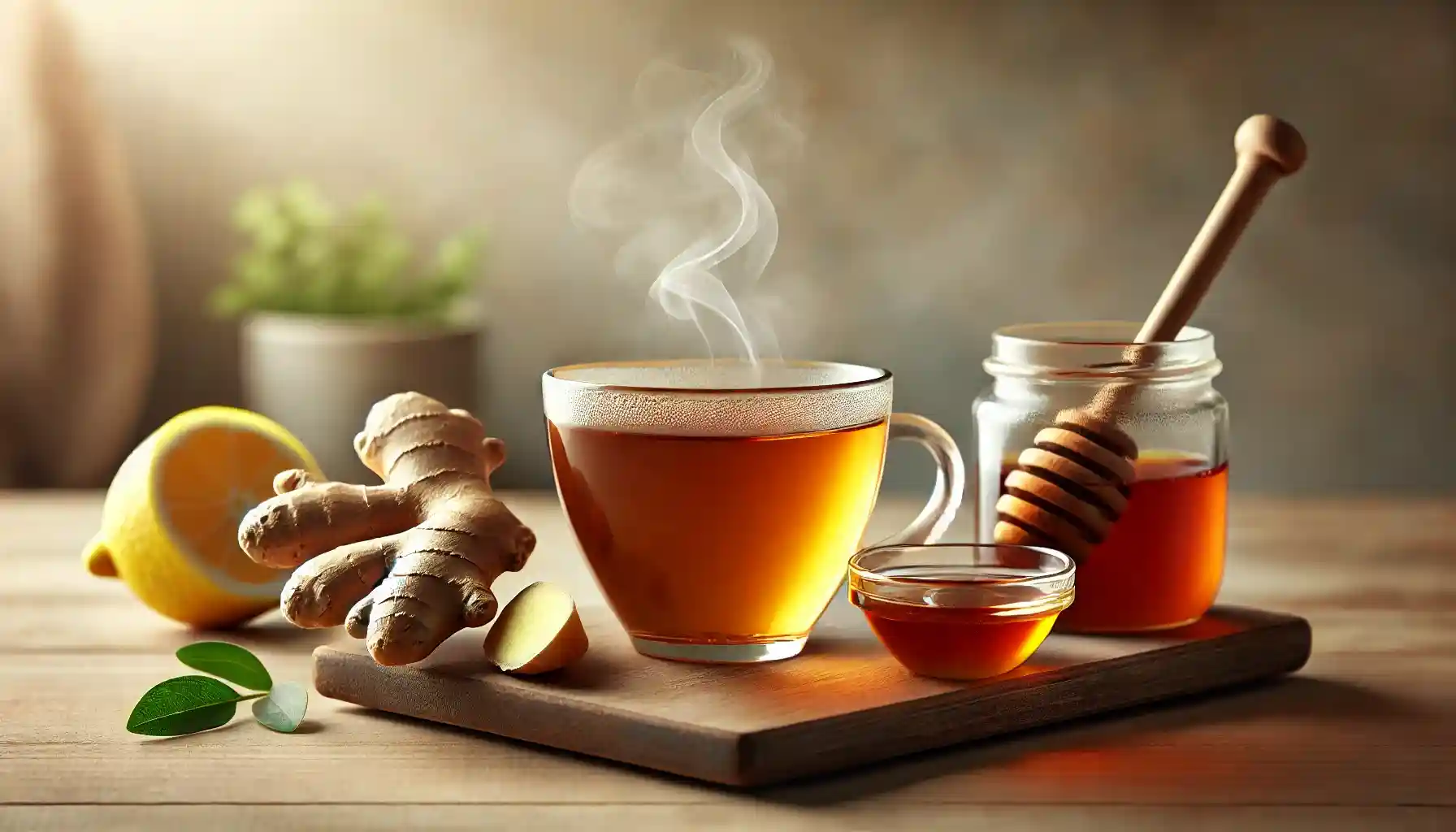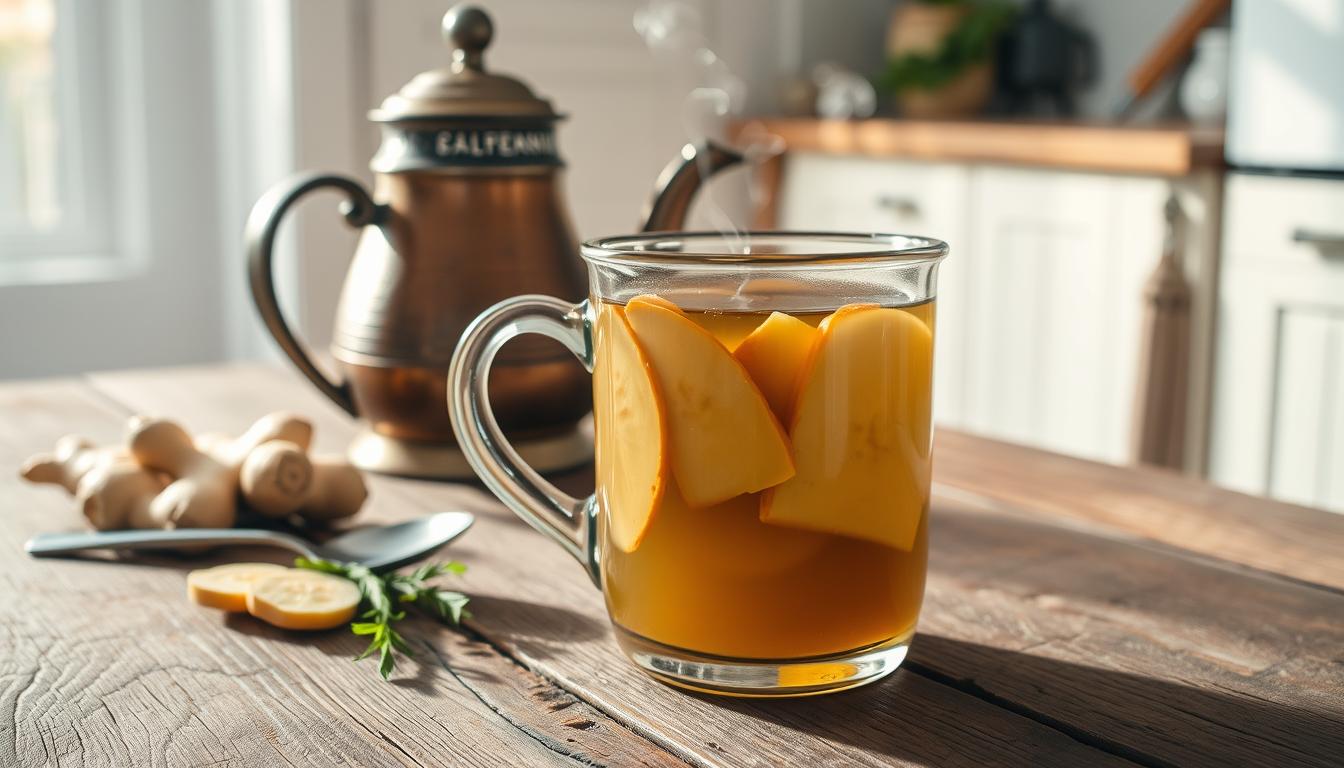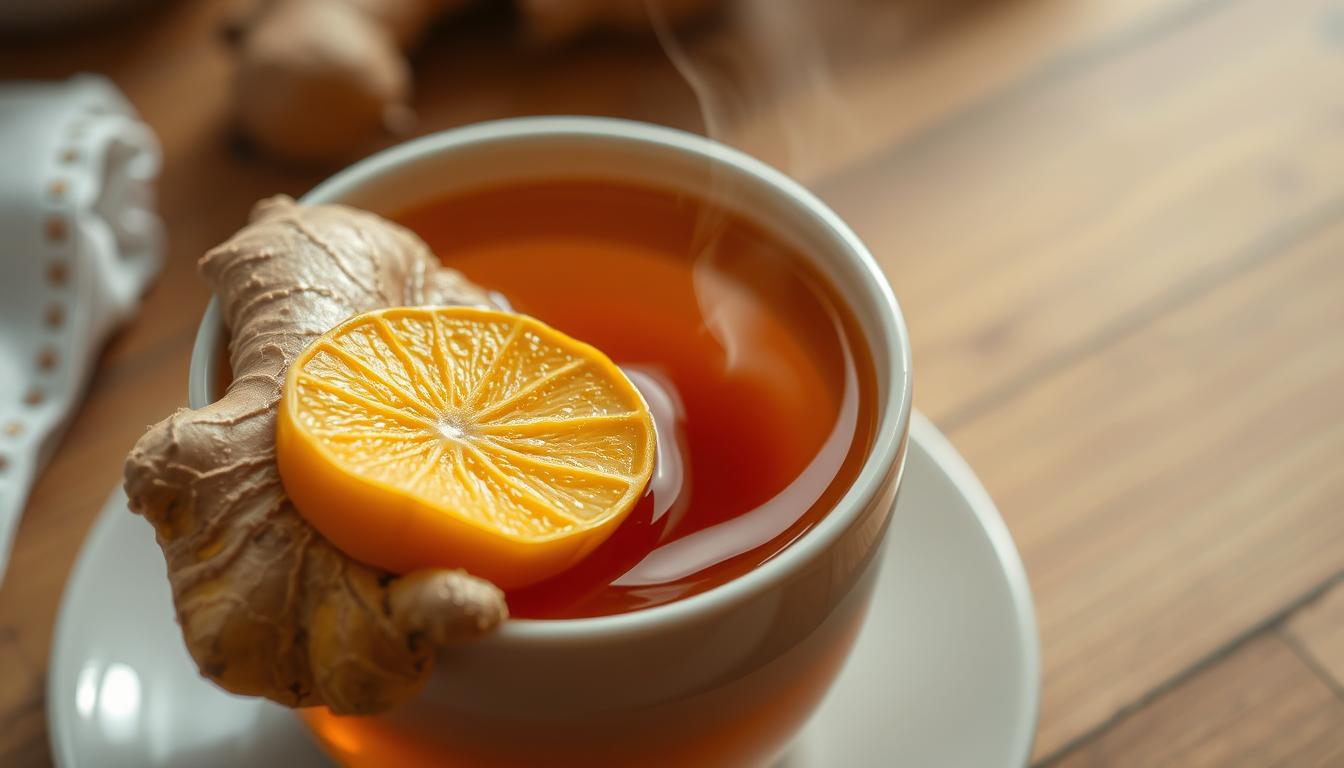Did you know that herbal infusions like ginger tea have been enjoyed for centuries, not just for their flavor but also for their health benefits? Unlike traditional brews made from Camellia sinensis, this beverage is crafted from fresh ginger root, making it a caffeine-free option for those seeking a soothing drink.
This aromatic infusion has roots in ancient medicine, where it was valued for its warming properties and digestive benefits. Today, it continues to be a popular choice for its versatility and natural goodness. Whether you’re looking to unwind or boost your well-being, this drink offers a blend of tradition and modern appeal.
In this article, we’ll explore how to prepare it, its potential health benefits, and what makes it stand out from other beverages. Join us as we dive into the world of this timeless herbal infusion and discover why it’s a favorite for many.
Key Takeaways
- Ginger tea is a caffeine-free herbal infusion made from fresh ginger root.
- It has been used for centuries for its medicinal and digestive benefits.
- This beverage is a great alternative to traditional caffeinated teas.
- It can be prepared with simple ingredients like water or milk.
- Ginger tea is known for its warming and soothing properties.
Introduction to Ginger Tea and Its Benefits
Rooted in ancient traditions, this herbal infusion has stood the test of time as a natural remedy. For centuries, it has been valued for its ability to ease nausea and provide a soothing effect on the body. Its preparation often involves fresh ginger root, water, and a splash of lemon, creating a drink that is both flavorful and beneficial.

In many cultures, this beverage has been a go-to remedy for calming stomach discomfort. Its warming properties make it a comforting cup to enjoy, especially during colder months. The combination of natural ingredients not only enhances its taste but also amplifies its health benefits.
Understanding the Roots and Tradition
Historically, this drink has been a cornerstone of folk medicine. Ancient records highlight its use in treating digestive issues and promoting overall wellness. The fresh ginger root was often boiled with water, and sometimes lemon was added for an extra zing. This simple yet effective preparation has been passed down through generations.
“The natural properties of ginger have been celebrated for their ability to soothe and heal, making it a timeless remedy.”
An Overview of Its Rising Popularity
Today, this beverage continues to gain traction as a natural, caffeine-free alternative to traditional teas. Its ability to alleviate nausea and improve digestion has made it a favorite among wellness enthusiasts. Whether enjoyed hot or cold, it offers a refreshing and healthful experience.
| Key Ingredient | Role |
|---|---|
| Fresh Ginger Root | Provides warming and digestive benefits |
| Lemon | Enhances flavor and adds a refreshing twist |
| Water | Base for brewing and hydration |
As we explore this drink further, we’ll uncover how traditional wisdom and modern science come together to explain its enduring appeal. Stay tuned to learn more about its preparation, benefits, and why it’s a must-try for anyone seeking a natural wellness boost.
What Is Ginger Tea: Origins and Preparation
For centuries, ginger has been celebrated not just as a spice but as a natural remedy with a rich history. Unlike traditional teas derived from the Camellia sinensis plant, this beverage is made from fresh ginger root, making it completely caffeine-free. Its unique flavor and health benefits have made it a staple in many cultures.

Historical Background and Traditional Uses
Ginger’s use dates back to ancient civilizations, where it was prized for its medicinal properties. It was commonly used to alleviate pain and improve digestion. In traditional Chinese and Ayurvedic medicine, ginger was often boiled with water to create a potent infusion. This practice continues today, with many still relying on its natural benefits.
Historical records highlight its role in treating ailments like nausea and inflammation. Its warming properties made it a go-to remedy during colder seasons. The simplicity of its preparation—ginger root and water—has been passed down through generations.
Modern Methods of Brewing and Variations
Today, brewing methods have evolved to suit modern lifestyles. While the traditional method involves boiling ginger slices in water, quick infusion techniques are now popular. These include using grated ginger or ginger powder for a faster brew.
Recent studies have explored the anti-inflammatory properties of ginger, particularly its bioactive compounds like gingerols and shogaols. These compounds are believed to contribute to its ability to relieve pain and inflammation.
Variations in preparation can affect the strength and flavor of the beverage. Adding lemon or honey enhances the taste while boosting its health benefits. Below is a table summarizing different brewing methods:
| Method | Description |
|---|---|
| Traditional Boiling | Simmer ginger slices in water for 10-15 minutes. |
| Quick Infusion | Use grated ginger or powder in hot water for 5 minutes. |
| Cold Brew | Steep ginger in cold water overnight for a refreshing drink. |
Whether you prefer a strong, spicy brew or a milder infusion, ginger tea offers versatility and health benefits. Its caffeine-free nature makes it an excellent choice for those seeking a soothing beverage without the jitters.
Does ginger tea have caffeine and Its Implications
Herbal infusions have long been a go-to for those seeking natural wellness solutions. Unlike traditional teas, which often contain caffeine, beverages like ginger tea are crafted from simple, natural ingredients. This makes them a popular choice for individuals looking to avoid stimulants while still enjoying a flavorful drink.
Herbal Infusions Versus Traditional Tea
Traditional teas, such as black or green tea, are derived from the Camellia sinensis plant and naturally contain caffeine. In contrast, herbal infusions like ginger tea are made from plants, roots, or flowers, making them entirely caffeine-free. This distinction is crucial for those sensitive to caffeine or looking to reduce their intake.
Herbal drinks are also rich in beneficial compounds that support overall health. For example, ginger contains bioactive ingredients like gingerols, which are known to reduce inflammation and combat disease. These properties make herbal infusions a healthier alternative for daily consumption.
What Caffeine-Free Means for Your Health
Choosing caffeine-free beverages can have a positive impact on your well-being. Without the stimulating effects of caffeine, drinks like ginger tea are less likely to disrupt sleep or elevate blood pressure. This makes them a safer option for individuals with specific health concerns.
Even a few minutes of brewing can extract high-quality ingredients from ginger, ensuring you receive its full benefits. Whether enjoyed hot or cold, this drink offers a soothing experience without the jitters associated with caffeine.
| Brewing Method | Benefits |
|---|---|
| Traditional Boiling | Extracts maximum flavor and nutrients |
| Quick Infusion | Convenient for busy lifestyles |
| Cold Brew | Preserves delicate compounds |
By understanding the differences between herbal infusions and traditional teas, you can make informed choices that align with your health goals. Ginger tea, with its natural goodness and caffeine-free profile, is a standout option for anyone seeking a calming and beneficial beverage.
Exploring the Health Benefits of Ginger Tea
Ginger tea has long been celebrated for its ability to support overall wellness, offering a range of health benefits that make it a popular choice for many. From easing nausea to reducing inflammation, this natural remedy has been a trusted companion for centuries. Its versatility and soothing properties make it a staple in daily wellness routines.
Natural Remedies for Nausea and Digestion
One of the most well-known health benefits of ginger tea is its ability to alleviate nausea. This is particularly helpful during pregnancy or for those experiencing motion sickness. The active compounds in ginger, such as gingerols, help calm the stomach and improve digestion.
To maximize these benefits, simply boil fresh ginger slices in water for 10-15 minutes. Adding a splash of lemon not only enhances the flavor but also boosts its digestive properties. This simple remedy has been a go-to solution for generations.
Anti-inflammatory and Pain Relief Properties
Ginger tea is also known for its anti-inflammatory effects. Studies suggest that the bioactive compounds in ginger can help reduce pain and inflammation. This makes it a natural alternative for those seeking relief from conditions like arthritis or muscle soreness.
By boiling ginger, you extract these potent compounds, creating a drink that supports overall well-being. Its warming properties make it especially comforting during colder months.
Support for Heart Health and Blood Pressure
Emerging research highlights ginger tea’s potential to support heart health. Regular consumption may help manage blood pressure and improve circulation. These benefits are attributed to ginger’s ability to relax blood vessels and reduce oxidative stress.
Enhancing the flavor with ingredients like honey or lemon can make this beverage even more enjoyable. Whether enjoyed hot or cold, ginger tea is a delicious way to support your cardiovascular health.
“Ginger tea’s natural properties make it a powerful ally for overall wellness, offering benefits that go beyond its soothing taste.”
| Health Benefit | Key Ingredient |
|---|---|
| Nausea Relief | Gingerols |
| Anti-inflammatory | Shogaols |
| Heart Health | Antioxidants |
From aiding digestion to supporting heart health, ginger tea’s health benefits are undeniable. Its natural goodness and versatility make it a must-have in any wellness routine. Whether you’re seeking relief or simply enjoying its flavor, this beverage is a timeless remedy for modern living.
Potential Downsides and Side Effects
While ginger tea offers numerous benefits, it’s essential to be aware of its potential downsides. Like any natural remedy, moderation is key to avoiding unwanted effects. Overconsumption can lead to mild discomfort, especially for those with sensitive systems.
Common Side Effects and Safety Considerations
Drinking ginger in excess may cause bloating, heartburn, or mild gastrointestinal discomfort. These side effects are typically mild but can be bothersome for some individuals. It’s important to monitor your cup ginger intake to avoid these issues.
For those on certain medications, ginger tea may interact with blood thinners or other drugs. Its natural compounds can affect blood clotting, so consulting a healthcare professional is advisable. Safety considerations are especially crucial for individuals with pre-existing conditions.
Guidelines for Moderate Consumption
Experts recommend limiting your cup ginger intake to 1-2 servings per day. This ensures you enjoy its benefits without overloading your system. Excessive drinking ginger tea can alter blood parameters and lead to discomfort.
Below is a table summarizing safe consumption guidelines:
| Daily Intake | Recommendation |
|---|---|
| 1-2 Cups | Ideal for most individuals |
| 3+ Cups | May lead to side effects |
If you experience any adverse effects, such as changes in blood pressure or stomach discomfort, reduce your intake. Always consult a healthcare provider if you have concerns about medication interactions or persistent side effects.
“Moderation is the key to enjoying the benefits of ginger tea without compromising your health.”
By following these guidelines, you can safely incorporate ginger tea may into your routine. Its natural properties make it a valuable addition to your wellness journey, provided it’s consumed responsibly.
Delicious Ginger Tea Recipes You Can Try at Home
Discover how to craft flavorful ginger tea recipes at home with ease. Whether you prefer a traditional brew or a creamy twist, these methods are simple and rewarding. Using fresh ingredients ensures you get the most out of this versatile plant.
Simple Boiling Water Method
Start with fresh ginger root, peeled and sliced. Add the slices to a pot of boiling water and let it simmer for 10-15 minutes. This method extracts the natural flavors and beneficial compounds, making it a soothing drink.
To avoid an overly strong infusion, adjust the amount of ginger or boiling water. Overdoing it may lead to discomfort like nausea vomiting. Adding a slice of lemon or a teaspoon of honey can enhance the taste and balance the pressure on your palate.
Innovative Milk-Based Ginger Tea Technique
For a creamier texture, try a milk-based recipe. Heat milk in a saucepan and add grated ginger. Let it steep for 5-7 minutes, stirring occasionally. This method creates a rich, comforting beverage perfect for colder days.
Moderation is key to prevent issues like vomit. Adjust the ginger quantity and steeping time to suit your taste. Adding a pinch of cinnamon or cardamom can elevate the flavor profile.
“Experimenting with flavors and techniques allows you to create a personalized ginger tea experience.”
These recipes highlight the versatility of the ginger plant. Whether you stick to the basics or get creative, you’ll enjoy a drink that’s both delicious and beneficial. Try these methods today and discover your favorite way to brew ginger tea.
Scientific Research Meets Folk Medicine
Modern science is now uncovering the secrets behind ginger’s long-standing medicinal reputation. For centuries, it has been a staple in traditional remedies, but today, researchers are exploring its bioactive compounds to understand its full potential. This blend of ancient wisdom and modern research offers a fascinating look into how ginger supports health.
Key Bioactive Compounds in Ginger Explained
Fresh ginger contains powerful compounds like gingerols and shogaols. These bioactive ingredients are responsible for its anti-inflammatory and antioxidant properties. Studies suggest they may help reduce oxidative stress in the body, potentially lowering the risk of chronic conditions like cancer.
Gingerols, in particular, are known for their ability to ease nausea and improve digestion. Shogaols, formed when ginger is dried or cooked, offer even stronger anti-inflammatory effects. Together, these compounds make ginger a versatile natural remedy.
Clinical Studies Versus Traditional Beliefs
Traditional medicine has long used ginger to treat ailments like nausea and pain. Modern clinical studies are now validating many of these claims. For example, research shows that ginger can reduce inflammation and may even inhibit the growth of certain cancer cells.
However, not all traditional uses have been fully supported by science. While ginger is generally safe, excessive consumption can lead to side effects like heartburn or bloating. It’s important to balance its benefits with moderation.
“The bioactive compounds in ginger bridge the gap between traditional remedies and modern medicine, offering a natural solution for various health concerns.”
| Compound | Health Benefit |
|---|---|
| Gingerols | Anti-inflammatory, nausea relief |
| Shogaols | Stronger anti-inflammatory effects |
While tea may offer a convenient way to enjoy ginger’s benefits, it’s essential to be mindful of potential side effects. For those with specific health conditions, consulting a healthcare provider is advisable. This ensures you can safely incorporate ginger into your wellness routine.
Incorporating Ginger Tea into Everyday Wellness
Integrating this herbal drink into your daily routine can be a simple yet effective way to enhance your well-being. Its caffeine-free nature makes it a versatile addition to any wellness plan. Whether you’re looking to soothe digestion or simply enjoy a calming beverage, it’s easy to make this drink a part of your day.
Tips for Maximizing Its Health Benefits
To get the most out of this beverage, consider drinking it in the morning or after meals. These times are ideal for its digestive and soothing properties. Pairing it with a light snack can also enhance its benefits, especially if you’re avoiding tea caffeine later in the day.
Brewing methods matter too. For maximum extraction of beneficial compounds, let the ginger steep in hot water for 10-15 minutes. Adjust the strength to suit your taste, ensuring it’s not too overpowering. Adding lemon or honey can balance the flavor while boosting its health benefits.
“Incorporating this drink into your routine can be a small change with big rewards for your health.”
If you’re on medication, consult your healthcare provider before making this drink a daily habit. While research highlights its benefits, it’s essential to ensure it doesn’t interfere with your treatment plan. Moderation is key to enjoying its advantages without any drawbacks.
By following these tips, you can seamlessly integrate this beverage into your lifestyle. Its natural goodness and versatility make it a valuable addition to your wellness journey.
Conclusion
Natural remedies like this one have been trusted for generations, offering both comfort and health benefits. A simple slice of fresh ginger can provide relief from nausea and inflammation, making it a go-to solution for many. Its versatility shines when compared to other remedies like turmeric, offering a unique blend of warmth and wellness.
This beverage is naturally caffeine-free, making it a safe choice for those seeking a soothing drink. Traditional preparation methods and modern research both highlight its ginger effective properties. Whether you’re brewing it for digestive support or simply enjoying its flavor, it’s a timeless addition to your routine.
Why not experiment with this remedy at home? Its natural goodness and ease of preparation make it a rewarding choice. Try it today and experience the benefits firsthand!

